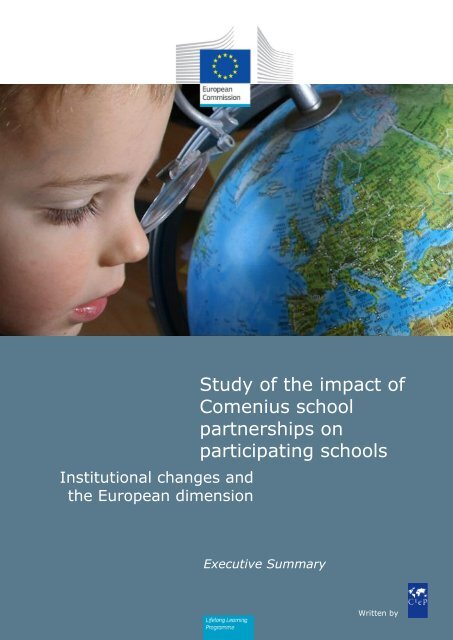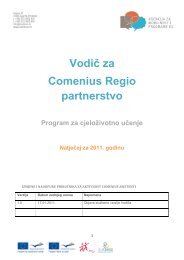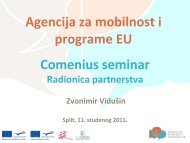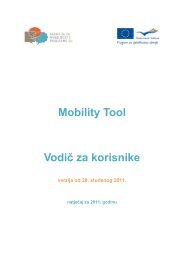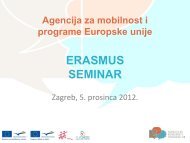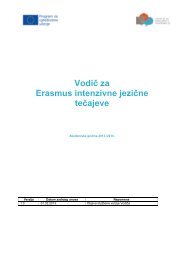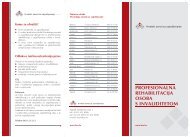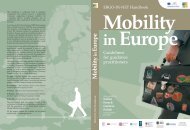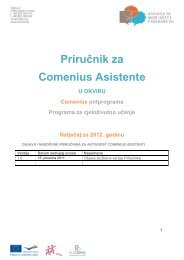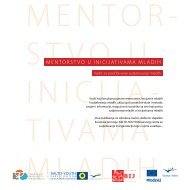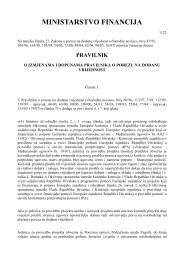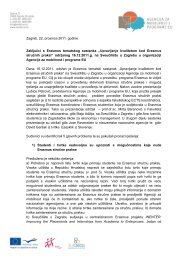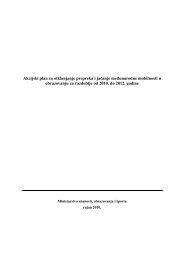Study of the impact of Comenius school partnerships on ...
Study of the impact of Comenius school partnerships on ...
Study of the impact of Comenius school partnerships on ...
You also want an ePaper? Increase the reach of your titles
YUMPU automatically turns print PDFs into web optimized ePapers that Google loves.
Instituti<strong>on</strong>al changes and<br />
<str<strong>on</strong>g>the</str<strong>on</strong>g> European dimensi<strong>on</strong><br />
<str<strong>on</strong>g>Study</str<strong>on</strong>g> <str<strong>on</strong>g>of</str<strong>on</strong>g> <str<strong>on</strong>g>the</str<strong>on</strong>g> <str<strong>on</strong>g>impact</str<strong>on</strong>g> <str<strong>on</strong>g>of</str<strong>on</strong>g><br />
<str<strong>on</strong>g>Comenius</str<strong>on</strong>g> <str<strong>on</strong>g>school</str<strong>on</strong>g><br />
<str<strong>on</strong>g>partnerships</str<strong>on</strong>g> <strong>on</strong><br />
participating <str<strong>on</strong>g>school</str<strong>on</strong>g>s<br />
Executive Summary<br />
Written by
1 <str<strong>on</strong>g>Study</str<strong>on</strong>g> c<strong>on</strong>text, object and methodology<br />
In <str<strong>on</strong>g>the</str<strong>on</strong>g> c<strong>on</strong>text <str<strong>on</strong>g>of</str<strong>on</strong>g> <str<strong>on</strong>g>the</str<strong>on</strong>g> preparati<strong>on</strong> <str<strong>on</strong>g>of</str<strong>on</strong>g> <str<strong>on</strong>g>the</str<strong>on</strong>g> new European “Erasmus for all” programme<br />
for educati<strong>on</strong> and training and <str<strong>on</strong>g>the</str<strong>on</strong>g> optimisati<strong>on</strong> <str<strong>on</strong>g>of</str<strong>on</strong>g> <str<strong>on</strong>g>the</str<strong>on</strong>g> current programme, this study<br />
provides an analysis <str<strong>on</strong>g>of</str<strong>on</strong>g> <str<strong>on</strong>g>the</str<strong>on</strong>g> <str<strong>on</strong>g>impact</str<strong>on</strong>g> <str<strong>on</strong>g>of</str<strong>on</strong>g> <str<strong>on</strong>g>Comenius</str<strong>on</strong>g> <str<strong>on</strong>g>school</str<strong>on</strong>g> <str<strong>on</strong>g>partnerships</str<strong>on</strong>g> <strong>on</strong><br />
participating instituti<strong>on</strong>s.<br />
Such <str<strong>on</strong>g>partnerships</str<strong>on</strong>g> c<strong>on</strong>stitute <strong>on</strong>e <str<strong>on</strong>g>of</str<strong>on</strong>g> <str<strong>on</strong>g>the</str<strong>on</strong>g> European Commissi<strong>on</strong>’s key acti<strong>on</strong>s<br />
in <str<strong>on</strong>g>the</str<strong>on</strong>g> field <str<strong>on</strong>g>of</str<strong>on</strong>g> <str<strong>on</strong>g>school</str<strong>on</strong>g> educati<strong>on</strong>. <str<strong>on</strong>g>Comenius</str<strong>on</strong>g> bilateral and multilateral <str<strong>on</strong>g>school</str<strong>on</strong>g><br />
<str<strong>on</strong>g>partnerships</str<strong>on</strong>g> last for two years and seek to streng<str<strong>on</strong>g>the</str<strong>on</strong>g>n <str<strong>on</strong>g>the</str<strong>on</strong>g> European dimensi<strong>on</strong> <str<strong>on</strong>g>of</str<strong>on</strong>g><br />
educati<strong>on</strong> by encouraging development <str<strong>on</strong>g>of</str<strong>on</strong>g> cooperati<strong>on</strong> activities between European<br />
<str<strong>on</strong>g>school</str<strong>on</strong>g>s. These projects provide pupils and teachers from a range <str<strong>on</strong>g>of</str<strong>on</strong>g> countries with<br />
opportunities to work toge<str<strong>on</strong>g>the</str<strong>on</strong>g>r <strong>on</strong> <strong>on</strong>e or more subjects <str<strong>on</strong>g>of</str<strong>on</strong>g> comm<strong>on</strong> interest. <str<strong>on</strong>g>Comenius</str<strong>on</strong>g><br />
multilateral <str<strong>on</strong>g>school</str<strong>on</strong>g> <str<strong>on</strong>g>partnerships</str<strong>on</strong>g> associate <str<strong>on</strong>g>school</str<strong>on</strong>g>s from at least three participating<br />
countries; <str<strong>on</strong>g>the</str<strong>on</strong>g>mes selected focus <strong>on</strong> pupils’ areas <str<strong>on</strong>g>of</str<strong>on</strong>g> interest, <strong>on</strong> current educati<strong>on</strong>al<br />
issues in <str<strong>on</strong>g>the</str<strong>on</strong>g> countries c<strong>on</strong>cerned, or <strong>on</strong> priorities set by <str<strong>on</strong>g>the</str<strong>on</strong>g> <str<strong>on</strong>g>school</str<strong>on</strong>g>s <str<strong>on</strong>g>the</str<strong>on</strong>g>mselves.<br />
<str<strong>on</strong>g>Comenius</str<strong>on</strong>g> bilateral <str<strong>on</strong>g>school</str<strong>on</strong>g> <str<strong>on</strong>g>partnerships</str<strong>on</strong>g> develop language projects comprising two<br />
reciprocal exchanges <str<strong>on</strong>g>of</str<strong>on</strong>g> classes for a minimum period <str<strong>on</strong>g>of</str<strong>on</strong>g> ten days, each designed for<br />
pupils aged twelve and above.<br />
Between 2007 and 2010, <str<strong>on</strong>g>the</str<strong>on</strong>g> acti<strong>on</strong> led to cooperati<strong>on</strong> between almost 26,000 <str<strong>on</strong>g>school</str<strong>on</strong>g>s<br />
and financed over 130,000 pupil and teacher mobilities per year.<br />
Commissi<strong>on</strong>ed by <str<strong>on</strong>g>the</str<strong>on</strong>g> European Commissi<strong>on</strong> and coordinated by <str<strong>on</strong>g>the</str<strong>on</strong>g> Centre<br />
Internati<strong>on</strong>al d’études pédagogiques (CIEP), <str<strong>on</strong>g>the</str<strong>on</strong>g> study looks at <str<strong>on</strong>g>the</str<strong>on</strong>g> changes<br />
brought about by <str<strong>on</strong>g>Comenius</str<strong>on</strong>g> bilateral and multilateral <str<strong>on</strong>g>partnerships</str<strong>on</strong>g> at <str<strong>on</strong>g>the</str<strong>on</strong>g> level <str<strong>on</strong>g>of</str<strong>on</strong>g><br />
<str<strong>on</strong>g>the</str<strong>on</strong>g> educati<strong>on</strong>al systems and <str<strong>on</strong>g>the</str<strong>on</strong>g> various stakeholders, and incorporates a<br />
comparative approach to <str<strong>on</strong>g>the</str<strong>on</strong>g> <str<strong>on</strong>g>impact</str<strong>on</strong>g> <str<strong>on</strong>g>of</str<strong>on</strong>g> o<str<strong>on</strong>g>the</str<strong>on</strong>g>r programmes, in particular <str<strong>on</strong>g>the</str<strong>on</strong>g> eTwinning<br />
acti<strong>on</strong> that has been part <str<strong>on</strong>g>of</str<strong>on</strong>g> <str<strong>on</strong>g>the</str<strong>on</strong>g> <str<strong>on</strong>g>Comenius</str<strong>on</strong>g> sectorial programme since 2007.<br />
The study was carried out between December 2009 and June 2012, and seeks to<br />
identify <str<strong>on</strong>g>the</str<strong>on</strong>g> effects <str<strong>on</strong>g>of</str<strong>on</strong>g> <str<strong>on</strong>g>Comenius</str<strong>on</strong>g> <str<strong>on</strong>g>school</str<strong>on</strong>g> <str<strong>on</strong>g>partnerships</str<strong>on</strong>g> <strong>on</strong> <str<strong>on</strong>g>the</str<strong>on</strong>g> <str<strong>on</strong>g>school</str<strong>on</strong>g>s involved<br />
and highlight <str<strong>on</strong>g>the</str<strong>on</strong>g>ir added value for beneficiaries (direct and indirect alike). It<br />
analyses pupils’, parents’ and o<str<strong>on</strong>g>the</str<strong>on</strong>g>r stakeholders’ participati<strong>on</strong> in partnership<br />
activities, <str<strong>on</strong>g>the</str<strong>on</strong>g> support provided by local communities (cooperati<strong>on</strong> with companies,<br />
associati<strong>on</strong>s and public authorities at local level) and disseminati<strong>on</strong> activities carried<br />
out by <str<strong>on</strong>g>the</str<strong>on</strong>g> <str<strong>on</strong>g>school</str<strong>on</strong>g>s.<br />
In order to rec<strong>on</strong>struct <str<strong>on</strong>g>the</str<strong>on</strong>g> full range <str<strong>on</strong>g>of</str<strong>on</strong>g> processes and interacti<strong>on</strong>s between actors<br />
taking part in <str<strong>on</strong>g>Comenius</str<strong>on</strong>g> <str<strong>on</strong>g>school</str<strong>on</strong>g> partnership projects, <str<strong>on</strong>g>the</str<strong>on</strong>g> methodology selected takes a<br />
qualitative and participative approach, based <strong>on</strong> field studies carried out in a total <str<strong>on</strong>g>of</str<strong>on</strong>g><br />
50 coordinating <str<strong>on</strong>g>school</str<strong>on</strong>g>s in 15 countries (Belgium, Est<strong>on</strong>ia, Finland, France, Germany,<br />
Greece, Holland, Hungary, Italy, Poland, Romania, Slovakia, Spain, Turkey and <str<strong>on</strong>g>the</str<strong>on</strong>g><br />
United Kingdom), which initiated <str<strong>on</strong>g>the</str<strong>on</strong>g>ir <str<strong>on</strong>g>partnerships</str<strong>on</strong>g> in 2009. The study required<br />
statistical processing <str<strong>on</strong>g>of</str<strong>on</strong>g> data ga<str<strong>on</strong>g>the</str<strong>on</strong>g>red prior to visits through questi<strong>on</strong>naires and later<br />
refined during fieldwork. Over forty indicators were drawn up to express qualitative<br />
data in statistical terms, while teleph<strong>on</strong>e interviews carried out after <str<strong>on</strong>g>the</str<strong>on</strong>g> completi<strong>on</strong> <str<strong>on</strong>g>of</str<strong>on</strong>g><br />
projects enabled analysis <str<strong>on</strong>g>of</str<strong>on</strong>g> results <str<strong>on</strong>g>of</str<strong>on</strong>g> sustainability strategies as well as <str<strong>on</strong>g>of</str<strong>on</strong>g> any<br />
problems encountered.<br />
November 2012, p.2
2 Main results <str<strong>on</strong>g>of</str<strong>on</strong>g> <str<strong>on</strong>g>the</str<strong>on</strong>g> study<br />
<str<strong>on</strong>g>Comenius</str<strong>on</strong>g> <str<strong>on</strong>g>school</str<strong>on</strong>g> <str<strong>on</strong>g>partnerships</str<strong>on</strong>g> have a highly significant <str<strong>on</strong>g>impact</str<strong>on</strong>g> <strong>on</strong> <str<strong>on</strong>g>the</str<strong>on</strong>g> <str<strong>on</strong>g>school</str<strong>on</strong>g><br />
community as a whole: in 75% <str<strong>on</strong>g>of</str<strong>on</strong>g> cases observed, it was perceived as being “quite<br />
str<strong>on</strong>g”, “str<strong>on</strong>g” or even “very str<strong>on</strong>g”. It was <strong>on</strong> pupils <str<strong>on</strong>g>the</str<strong>on</strong>g>mselves that <str<strong>on</strong>g>the</str<strong>on</strong>g> <str<strong>on</strong>g>impact</str<strong>on</strong>g><br />
was greatest, followed by teachers and <str<strong>on</strong>g>the</str<strong>on</strong>g>n by <str<strong>on</strong>g>the</str<strong>on</strong>g> <str<strong>on</strong>g>school</str<strong>on</strong>g>s and <str<strong>on</strong>g>the</str<strong>on</strong>g>ir envir<strong>on</strong>ment.<br />
Impact <strong>on</strong> participating pupils<br />
As far as pupils are c<strong>on</strong>cerned, <str<strong>on</strong>g>the</str<strong>on</strong>g> most significant effects were c<strong>on</strong>nected to <str<strong>on</strong>g>the</str<strong>on</strong>g>ir<br />
participati<strong>on</strong> in partnership activities.<br />
Greater interest in o<str<strong>on</strong>g>the</str<strong>on</strong>g>r European countries and <str<strong>on</strong>g>the</str<strong>on</strong>g>ir cultures<br />
<str<strong>on</strong>g>Comenius</str<strong>on</strong>g> <str<strong>on</strong>g>school</str<strong>on</strong>g> <str<strong>on</strong>g>partnerships</str<strong>on</strong>g> arouse pupils’ interest in o<str<strong>on</strong>g>the</str<strong>on</strong>g>r European countries and<br />
<str<strong>on</strong>g>the</str<strong>on</strong>g>ir cultures. The exchanges and activities carried out with European partners<br />
c<strong>on</strong>stitute a laboratory for active European citizenship and set <str<strong>on</strong>g>the</str<strong>on</strong>g> scene for<br />
intercultural dialogue between European pupils. In 82% <str<strong>on</strong>g>of</str<strong>on</strong>g> <str<strong>on</strong>g>school</str<strong>on</strong>g>s, pupils’<br />
participati<strong>on</strong> in a <str<strong>on</strong>g>Comenius</str<strong>on</strong>g> <str<strong>on</strong>g>school</str<strong>on</strong>g> partnership helped increase <str<strong>on</strong>g>the</str<strong>on</strong>g>ir interest in o<str<strong>on</strong>g>the</str<strong>on</strong>g>r<br />
European countries and <str<strong>on</strong>g>the</str<strong>on</strong>g>ir cultures. This data matches <str<strong>on</strong>g>the</str<strong>on</strong>g> c<strong>on</strong>clusi<strong>on</strong>s <str<strong>on</strong>g>of</str<strong>on</strong>g> an earlier<br />
survey carried out in 2007 <strong>on</strong> behalf <str<strong>on</strong>g>of</str<strong>on</strong>g> <str<strong>on</strong>g>the</str<strong>on</strong>g> European Commissi<strong>on</strong>.<br />
Improvement <str<strong>on</strong>g>of</str<strong>on</strong>g> language skills<br />
Bilateral and multilateral <str<strong>on</strong>g>school</str<strong>on</strong>g> <str<strong>on</strong>g>partnerships</str<strong>on</strong>g> have a positive influence <strong>on</strong> <str<strong>on</strong>g>the</str<strong>on</strong>g> way in<br />
which pupils regard foreign languages, and <str<strong>on</strong>g>the</str<strong>on</strong>g>ir c<strong>on</strong>sequences are felt by all members<br />
<str<strong>on</strong>g>of</str<strong>on</strong>g> <str<strong>on</strong>g>the</str<strong>on</strong>g> <str<strong>on</strong>g>school</str<strong>on</strong>g> community, including parents. It is also expressed by an improvement in<br />
pupils’ skills, with <str<strong>on</strong>g>impact</str<strong>on</strong>g> varying depending <strong>on</strong> educati<strong>on</strong>al level, how l<strong>on</strong>g <str<strong>on</strong>g>the</str<strong>on</strong>g>y were<br />
exposed to <str<strong>on</strong>g>the</str<strong>on</strong>g> language, and objectives set by <str<strong>on</strong>g>the</str<strong>on</strong>g> teachers <str<strong>on</strong>g>the</str<strong>on</strong>g>mselves.<br />
Figure 1: Impact <strong>on</strong> improvement <str<strong>on</strong>g>of</str<strong>on</strong>g> participating pupils’ language skills<br />
Communicating in a foreign language in a c<strong>on</strong>text removed from <str<strong>on</strong>g>the</str<strong>on</strong>g>ir everyday<br />
experience leads many pupils to overcome previous difficulties and develop greater<br />
self-c<strong>on</strong>fidence. Although English retains its prominence, many <str<strong>on</strong>g>Comenius</str<strong>on</strong>g> <str<strong>on</strong>g>school</str<strong>on</strong>g><br />
<str<strong>on</strong>g>partnerships</str<strong>on</strong>g> go out <str<strong>on</strong>g>of</str<strong>on</strong>g> <str<strong>on</strong>g>the</str<strong>on</strong>g>ir way to acquaint pupils with Europe’s linguistic diversity.<br />
November 2012, p.3
With regard to younger pupils, it is <str<strong>on</strong>g>of</str<strong>on</strong>g>ten a questi<strong>on</strong> <str<strong>on</strong>g>of</str<strong>on</strong>g> raising <str<strong>on</strong>g>the</str<strong>on</strong>g>ir awareness <str<strong>on</strong>g>of</str<strong>on</strong>g> <str<strong>on</strong>g>the</str<strong>on</strong>g><br />
diversity <str<strong>on</strong>g>of</str<strong>on</strong>g> languages. Sec<strong>on</strong>dary <str<strong>on</strong>g>school</str<strong>on</strong>g> pupils, <strong>on</strong> <str<strong>on</strong>g>the</str<strong>on</strong>g> o<str<strong>on</strong>g>the</str<strong>on</strong>g>r hand, tend to see<br />
improvement <str<strong>on</strong>g>of</str<strong>on</strong>g> <str<strong>on</strong>g>the</str<strong>on</strong>g>ir language skills as beneficial to <str<strong>on</strong>g>the</str<strong>on</strong>g>ir pr<str<strong>on</strong>g>of</str<strong>on</strong>g>essi<strong>on</strong>al futures.<br />
<str<strong>on</strong>g>Comenius</str<strong>on</strong>g> <str<strong>on</strong>g>school</str<strong>on</strong>g> <str<strong>on</strong>g>partnerships</str<strong>on</strong>g> also c<strong>on</strong>tribute to ano<str<strong>on</strong>g>the</str<strong>on</strong>g>r <strong>on</strong>e <str<strong>on</strong>g>of</str<strong>on</strong>g> <str<strong>on</strong>g>the</str<strong>on</strong>g> European Uni<strong>on</strong>’s<br />
key objectives (“Educati<strong>on</strong> and Training 2020”) – pr<str<strong>on</strong>g>of</str<strong>on</strong>g>iciency in communicating in <str<strong>on</strong>g>the</str<strong>on</strong>g><br />
mo<str<strong>on</strong>g>the</str<strong>on</strong>g>r t<strong>on</strong>gue. Many project activities are carried out in pupils’ own languages, and<br />
progress has been observed at all levels.<br />
Significant improvement in cross-cutting key skills<br />
Development <str<strong>on</strong>g>of</str<strong>on</strong>g> social and civic competences<br />
A decline in feelings <str<strong>on</strong>g>of</str<strong>on</strong>g> prejudice within <str<strong>on</strong>g>school</str<strong>on</strong>g>s is frequently remarked by <str<strong>on</strong>g>Comenius</str<strong>on</strong>g><br />
project participants. Projects change <str<strong>on</strong>g>the</str<strong>on</strong>g> images that pupils have <str<strong>on</strong>g>of</str<strong>on</strong>g> partner countries.<br />
The two driving forces behind cultural exchanges are <str<strong>on</strong>g>the</str<strong>on</strong>g> desire to communicate and<br />
<str<strong>on</strong>g>the</str<strong>on</strong>g> sharing <str<strong>on</strong>g>of</str<strong>on</strong>g> work by pupils <str<strong>on</strong>g>of</str<strong>on</strong>g> several different nati<strong>on</strong>alities. <str<strong>on</strong>g>Comenius</str<strong>on</strong>g> <str<strong>on</strong>g>partnerships</str<strong>on</strong>g><br />
also help to develop pupils’ civic competences, by helping <str<strong>on</strong>g>the</str<strong>on</strong>g>m to respect o<str<strong>on</strong>g>the</str<strong>on</strong>g>r<br />
people’s differences, by giving <str<strong>on</strong>g>the</str<strong>on</strong>g>m resp<strong>on</strong>sibility, and by enabling <str<strong>on</strong>g>the</str<strong>on</strong>g>m to work – at<br />
sec<strong>on</strong>dary <str<strong>on</strong>g>school</str<strong>on</strong>g> level in particular – <strong>on</strong> <str<strong>on</strong>g>the</str<strong>on</strong>g> c<strong>on</strong>structi<strong>on</strong> <str<strong>on</strong>g>of</str<strong>on</strong>g> European identity and<br />
citizenship al<strong>on</strong>gside o<str<strong>on</strong>g>the</str<strong>on</strong>g>r pupils in Europe.<br />
Creative skills encouraged<br />
<str<strong>on</strong>g>Comenius</str<strong>on</strong>g> projects help return creativity and pupils’ artistic expressi<strong>on</strong> to <str<strong>on</strong>g>the</str<strong>on</strong>g>ir rightful<br />
place <strong>on</strong> <str<strong>on</strong>g>the</str<strong>on</strong>g> <str<strong>on</strong>g>school</str<strong>on</strong>g> timetable. They provide opportunities – sometimes never before<br />
encountered – for pupils to express <str<strong>on</strong>g>the</str<strong>on</strong>g>mselves through collaborati<strong>on</strong> with pupils <str<strong>on</strong>g>of</str<strong>on</strong>g><br />
different nati<strong>on</strong>alities and who speak different languages. Development <str<strong>on</strong>g>of</str<strong>on</strong>g> creative<br />
skills combined with o<str<strong>on</strong>g>the</str<strong>on</strong>g>r competences encourages a spirit <str<strong>on</strong>g>of</str<strong>on</strong>g> competiti<strong>on</strong>, bringing<br />
out <str<strong>on</strong>g>the</str<strong>on</strong>g> best in those pupils who experience problems in more academic subjects.<br />
Computer skills<br />
Improvement <str<strong>on</strong>g>of</str<strong>on</strong>g> computer skills is a major objective in most <str<strong>on</strong>g>Comenius</str<strong>on</strong>g> bilateral and<br />
multilateral <str<strong>on</strong>g>school</str<strong>on</strong>g> <str<strong>on</strong>g>partnerships</str<strong>on</strong>g>. Use <str<strong>on</strong>g>of</str<strong>on</strong>g> Informati<strong>on</strong> and Communicati<strong>on</strong> Technologies<br />
(ICT) in interdisciplinary projects enables pupils to activate informally acquired skills.<br />
The inclusive aspect <str<strong>on</strong>g>of</str<strong>on</strong>g> such skills reduces inequalities in <str<strong>on</strong>g>school</str<strong>on</strong>g>s, motivating all<br />
participants as actors within <str<strong>on</strong>g>the</str<strong>on</strong>g> project and renewing motivati<strong>on</strong> am<strong>on</strong>g struggling<br />
pupils. Computer skills should be c<strong>on</strong>sidered as part <str<strong>on</strong>g>of</str<strong>on</strong>g> “learning to learn” skills in<br />
general, as <str<strong>on</strong>g>the</str<strong>on</strong>g>y help make pupils more self-sufficient. Bey<strong>on</strong>d <str<strong>on</strong>g>the</str<strong>on</strong>g> projects<br />
<str<strong>on</strong>g>the</str<strong>on</strong>g>mselves, pupils can feed such skills back into o<str<strong>on</strong>g>the</str<strong>on</strong>g>r kinds <str<strong>on</strong>g>of</str<strong>on</strong>g> learning activities.<br />
Learning to learn<br />
<str<strong>on</strong>g>Comenius</str<strong>on</strong>g> <str<strong>on</strong>g>school</str<strong>on</strong>g> <str<strong>on</strong>g>partnerships</str<strong>on</strong>g> c<strong>on</strong>tribute to <str<strong>on</strong>g>the</str<strong>on</strong>g> development <str<strong>on</strong>g>of</str<strong>on</strong>g> pupils’ “learning to<br />
learn” skills. They acquire greater self-c<strong>on</strong>fidence and greater capacities for working in<br />
groups or <strong>on</strong> <str<strong>on</strong>g>the</str<strong>on</strong>g>ir own. The <str<strong>on</strong>g>impact</str<strong>on</strong>g> is yet str<strong>on</strong>ger when activities take place outside<br />
<str<strong>on</strong>g>the</str<strong>on</strong>g> <str<strong>on</strong>g>school</str<strong>on</strong>g>. Participati<strong>on</strong> in group work (abroad or in home <str<strong>on</strong>g>school</str<strong>on</strong>g>s) helps give pupils a<br />
greater sense <str<strong>on</strong>g>of</str<strong>on</strong>g> resp<strong>on</strong>sibility.<br />
Competences to be encouraged<br />
Sense <str<strong>on</strong>g>of</str<strong>on</strong>g> initiative and entrepreneurship<br />
Although <str<strong>on</strong>g>the</str<strong>on</strong>g> “sense <str<strong>on</strong>g>of</str<strong>on</strong>g> initiative and entrepreneurship” is not yet a priority<br />
competence in <str<strong>on</strong>g>Comenius</str<strong>on</strong>g> projects, various examples observed bear witness to<br />
innovative practices in this area. Activities fostering self-sufficiency – frequently<br />
incorporated into <str<strong>on</strong>g>Comenius</str<strong>on</strong>g> projects – seem especially well suited to development <str<strong>on</strong>g>of</str<strong>on</strong>g><br />
November 2012, p.4
this skill. Projects focusing <strong>on</strong> relati<strong>on</strong>s with companies are to be encouraged as <str<strong>on</strong>g>the</str<strong>on</strong>g>y<br />
help increase educati<strong>on</strong>al systems’ awareness <str<strong>on</strong>g>of</str<strong>on</strong>g> ec<strong>on</strong>omic realities.<br />
<str<strong>on</strong>g>Comenius</str<strong>on</strong>g> and <str<strong>on</strong>g>the</str<strong>on</strong>g> sciences<br />
Improvement in pupils’ ma<str<strong>on</strong>g>the</str<strong>on</strong>g>matical competence and basic competences in science<br />
and technologies was observed in projects focusing <strong>on</strong> such skills, which are <str<strong>on</strong>g>of</str<strong>on</strong>g>ten<br />
incorporated into an interdisciplinary initiative that enables pupils to develop <str<strong>on</strong>g>the</str<strong>on</strong>g>ir civic<br />
competences and enriches intercultural dialogue with partner <str<strong>on</strong>g>school</str<strong>on</strong>g>s. The ways in<br />
which <str<strong>on</strong>g>the</str<strong>on</strong>g> sciences are perceived and learned, and pupils’ ability to link <str<strong>on</strong>g>the</str<strong>on</strong>g>m to <str<strong>on</strong>g>the</str<strong>on</strong>g><br />
major issues running through modern society, are transformed by <str<strong>on</strong>g>Comenius</str<strong>on</strong>g> projects.<br />
This new way <str<strong>on</strong>g>of</str<strong>on</strong>g> working gives pupils a taste for science subjects, and sometimes –<br />
particularly am<strong>on</strong>g girls – fosters a desire to c<strong>on</strong>tinue <str<strong>on</strong>g>the</str<strong>on</strong>g>ir studies <strong>on</strong> that path.<br />
Figure 2 Impact <strong>on</strong> pupils: improvement <str<strong>on</strong>g>of</str<strong>on</strong>g> key skills<br />
Impact <strong>on</strong> teachers<br />
With regard to teachers, <str<strong>on</strong>g>the</str<strong>on</strong>g> most significant <str<strong>on</strong>g>impact</str<strong>on</strong>g> <str<strong>on</strong>g>of</str<strong>on</strong>g> <str<strong>on</strong>g>Comenius</str<strong>on</strong>g> <str<strong>on</strong>g>school</str<strong>on</strong>g> <str<strong>on</strong>g>partnerships</str<strong>on</strong>g><br />
is related to <str<strong>on</strong>g>the</str<strong>on</strong>g> improvement <str<strong>on</strong>g>of</str<strong>on</strong>g> knowledge <str<strong>on</strong>g>of</str<strong>on</strong>g> o<str<strong>on</strong>g>the</str<strong>on</strong>g>r educati<strong>on</strong>al systems and <str<strong>on</strong>g>of</str<strong>on</strong>g> social<br />
competences. The projects also help develop <str<strong>on</strong>g>the</str<strong>on</strong>g>ir computer skills and English<br />
language skills, al<strong>on</strong>g with competences o<str<strong>on</strong>g>the</str<strong>on</strong>g>r than those <str<strong>on</strong>g>the</str<strong>on</strong>g>y use as a matter <str<strong>on</strong>g>of</str<strong>on</strong>g><br />
course in <str<strong>on</strong>g>the</str<strong>on</strong>g>ir daily pr<str<strong>on</strong>g>of</str<strong>on</strong>g>essi<strong>on</strong>al lives.<br />
Better knowledge <str<strong>on</strong>g>of</str<strong>on</strong>g> o<str<strong>on</strong>g>the</str<strong>on</strong>g>r educati<strong>on</strong>al systems<br />
In two thirds <str<strong>on</strong>g>of</str<strong>on</strong>g> <str<strong>on</strong>g>the</str<strong>on</strong>g> <str<strong>on</strong>g>school</str<strong>on</strong>g>s involved, <str<strong>on</strong>g>Comenius</str<strong>on</strong>g> <str<strong>on</strong>g>school</str<strong>on</strong>g> <str<strong>on</strong>g>partnerships</str<strong>on</strong>g> significantly<br />
improved participating teachers’ knowledge <str<strong>on</strong>g>of</str<strong>on</strong>g> o<str<strong>on</strong>g>the</str<strong>on</strong>g>r educati<strong>on</strong>al systems, particularly<br />
as regards competences acquired by pupils at partner <str<strong>on</strong>g>school</str<strong>on</strong>g>s and various aspects <str<strong>on</strong>g>of</str<strong>on</strong>g><br />
such systems (curricula, evaluati<strong>on</strong>, etc.), but less usually as regards educati<strong>on</strong><br />
policies. Work c<strong>on</strong>diti<strong>on</strong>s (salaries, status, working hours, etc.) observed during<br />
teacher mobilities also form <str<strong>on</strong>g>the</str<strong>on</strong>g> subject <str<strong>on</strong>g>of</str<strong>on</strong>g> much discussi<strong>on</strong>. Analysis <str<strong>on</strong>g>of</str<strong>on</strong>g> educati<strong>on</strong>al<br />
systems in neighbouring countries <str<strong>on</strong>g>of</str<strong>on</strong>g>ten helps <str<strong>on</strong>g>school</str<strong>on</strong>g>s to decide up<strong>on</strong> <str<strong>on</strong>g>the</str<strong>on</strong>g> topic <str<strong>on</strong>g>of</str<strong>on</strong>g> <str<strong>on</strong>g>the</str<strong>on</strong>g>ir<br />
project and also c<strong>on</strong>tributes to awareness <str<strong>on</strong>g>of</str<strong>on</strong>g> a pr<str<strong>on</strong>g>of</str<strong>on</strong>g>essi<strong>on</strong>al culture comm<strong>on</strong> to<br />
European teachers in general.<br />
November 2012, p.5
Figure 3 Impact <strong>on</strong> teachers<br />
Improvement <str<strong>on</strong>g>of</str<strong>on</strong>g> teachers’ social and organisati<strong>on</strong>al competences<br />
<str<strong>on</strong>g>Comenius</str<strong>on</strong>g> <str<strong>on</strong>g>school</str<strong>on</strong>g> <str<strong>on</strong>g>partnerships</str<strong>on</strong>g> improve teachers’ ability to work in European and<br />
interdisciplinary teams. The <str<strong>on</strong>g>impact</str<strong>on</strong>g> is str<strong>on</strong>ger in multilateral than in bilateral<br />
<str<strong>on</strong>g>partnerships</str<strong>on</strong>g> and, in <str<strong>on</strong>g>the</str<strong>on</strong>g> case <str<strong>on</strong>g>of</str<strong>on</strong>g> <str<strong>on</strong>g>the</str<strong>on</strong>g> former, varies depending <strong>on</strong> <str<strong>on</strong>g>the</str<strong>on</strong>g> number <str<strong>on</strong>g>of</str<strong>on</strong>g><br />
teachers and partners involved. Teachers appreciate <str<strong>on</strong>g>the</str<strong>on</strong>g>se new styles <str<strong>on</strong>g>of</str<strong>on</strong>g> collaborative<br />
work, which <str<strong>on</strong>g>of</str<strong>on</strong>g>ten differ vastly from <str<strong>on</strong>g>the</str<strong>on</strong>g>ir usual pr<str<strong>on</strong>g>of</str<strong>on</strong>g>essi<strong>on</strong>al practices.<br />
<str<strong>on</strong>g>Comenius</str<strong>on</strong>g> <str<strong>on</strong>g>school</str<strong>on</strong>g> <str<strong>on</strong>g>partnerships</str<strong>on</strong>g> have a proven <str<strong>on</strong>g>impact</str<strong>on</strong>g> <strong>on</strong> teachers’ – and, above all,<br />
coordinators’ – organisati<strong>on</strong>al competences. It is <str<strong>on</strong>g>of</str<strong>on</strong>g>ten a questi<strong>on</strong> <str<strong>on</strong>g>of</str<strong>on</strong>g> acquiring new<br />
competences that c<strong>on</strong>tribute to <str<strong>on</strong>g>the</str<strong>on</strong>g> highlighting and pr<str<strong>on</strong>g>of</str<strong>on</strong>g>essi<strong>on</strong>al development <str<strong>on</strong>g>of</str<strong>on</strong>g> <str<strong>on</strong>g>the</str<strong>on</strong>g><br />
coordinator’s functi<strong>on</strong>, and which may be reinvested bey<strong>on</strong>d <str<strong>on</strong>g>the</str<strong>on</strong>g> project’s c<strong>on</strong>tractual<br />
durati<strong>on</strong>.<br />
Improvement <str<strong>on</strong>g>of</str<strong>on</strong>g> language skills, mainly in English<br />
<str<strong>on</strong>g>Comenius</str<strong>on</strong>g> <str<strong>on</strong>g>school</str<strong>on</strong>g> <str<strong>on</strong>g>partnerships</str<strong>on</strong>g> c<strong>on</strong>tribute to specialist and n<strong>on</strong>-specialist teachers’<br />
language skills by providing <str<strong>on</strong>g>the</str<strong>on</strong>g>m with an opportunity to c<strong>on</strong>verse and work in a<br />
foreign language. In over half <str<strong>on</strong>g>the</str<strong>on</strong>g> <str<strong>on</strong>g>school</str<strong>on</strong>g>s, <str<strong>on</strong>g>partnerships</str<strong>on</strong>g> had a major <str<strong>on</strong>g>impact</str<strong>on</strong>g> <strong>on</strong> <str<strong>on</strong>g>the</str<strong>on</strong>g><br />
improvement <str<strong>on</strong>g>of</str<strong>on</strong>g> participating teachers’ English language skills. Their <str<strong>on</strong>g>impact</str<strong>on</strong>g> <strong>on</strong> <str<strong>on</strong>g>the</str<strong>on</strong>g><br />
development <str<strong>on</strong>g>of</str<strong>on</strong>g> skills in languages o<str<strong>on</strong>g>the</str<strong>on</strong>g>r than English was less marked.<br />
Besides <str<strong>on</strong>g>the</str<strong>on</strong>g> effect this has <strong>on</strong> teachers’ pr<str<strong>on</strong>g>of</str<strong>on</strong>g>essi<strong>on</strong>al development, <str<strong>on</strong>g>the</str<strong>on</strong>g> indirect <str<strong>on</strong>g>impact</str<strong>on</strong>g><br />
it has <strong>on</strong> <str<strong>on</strong>g>the</str<strong>on</strong>g>ir pupils should also be emphasised. By putting teachers in a positi<strong>on</strong><br />
where <str<strong>on</strong>g>the</str<strong>on</strong>g>y have to communicate in ano<str<strong>on</strong>g>the</str<strong>on</strong>g>r language and different cultural c<strong>on</strong>text,<br />
<str<strong>on</strong>g>the</str<strong>on</strong>g> projects make <str<strong>on</strong>g>the</str<strong>on</strong>g>m aware <str<strong>on</strong>g>of</str<strong>on</strong>g> <str<strong>on</strong>g>the</str<strong>on</strong>g> linguistic and cultural difficulties that some <str<strong>on</strong>g>of</str<strong>on</strong>g><br />
<str<strong>on</strong>g>the</str<strong>on</strong>g>ir pupils have to cope with, and so take better account <str<strong>on</strong>g>of</str<strong>on</strong>g> <str<strong>on</strong>g>the</str<strong>on</strong>g>m.<br />
Computer skills<br />
<str<strong>on</strong>g>Comenius</str<strong>on</strong>g> <str<strong>on</strong>g>school</str<strong>on</strong>g> <str<strong>on</strong>g>partnerships</str<strong>on</strong>g> enable teachers to develop <str<strong>on</strong>g>the</str<strong>on</strong>g>ir ICT pr<str<strong>on</strong>g>of</str<strong>on</strong>g>iciency. Such<br />
competences are largely developed through self-training or peer training, even if<br />
dedicated courses may sometimes be held in-house. Collaborative work methods<br />
generate new competences that may readily be invested outside <str<strong>on</strong>g>the</str<strong>on</strong>g> project itself.<br />
November 2012, p.6
Pr<str<strong>on</strong>g>of</str<strong>on</strong>g>essi<strong>on</strong>al development<br />
<str<strong>on</strong>g>Comenius</str<strong>on</strong>g> <str<strong>on</strong>g>school</str<strong>on</strong>g> <str<strong>on</strong>g>partnerships</str<strong>on</strong>g> help improve teacher-training quality, as <str<strong>on</strong>g>the</str<strong>on</strong>g>y enable<br />
<str<strong>on</strong>g>the</str<strong>on</strong>g> exchange <str<strong>on</strong>g>of</str<strong>on</strong>g> best practices and stimulate <str<strong>on</strong>g>the</str<strong>on</strong>g> demand for <strong>on</strong>going training,<br />
primarily focused <strong>on</strong> language skills, as well as <strong>on</strong> ICT pr<str<strong>on</strong>g>of</str<strong>on</strong>g>iciency. The opportunities<br />
provided by <str<strong>on</strong>g>Comenius</str<strong>on</strong>g> training grants ought to be brought to teachers’ attenti<strong>on</strong> more<br />
effectively, and be more closely interc<strong>on</strong>nected with <str<strong>on</strong>g>Comenius</str<strong>on</strong>g> <str<strong>on</strong>g>school</str<strong>on</strong>g> <str<strong>on</strong>g>partnerships</str<strong>on</strong>g>.<br />
Impact <strong>on</strong> <str<strong>on</strong>g>school</str<strong>on</strong>g>s and <str<strong>on</strong>g>the</str<strong>on</strong>g>ir envir<strong>on</strong>ment<br />
<str<strong>on</strong>g>Comenius</str<strong>on</strong>g> <str<strong>on</strong>g>school</str<strong>on</strong>g> <str<strong>on</strong>g>partnerships</str<strong>on</strong>g> make a c<strong>on</strong>siderable c<strong>on</strong>tributi<strong>on</strong> to streng<str<strong>on</strong>g>the</str<strong>on</strong>g>ning<br />
<str<strong>on</strong>g>school</str<strong>on</strong>g>s’ European dimensi<strong>on</strong>, improving <str<strong>on</strong>g>the</str<strong>on</strong>g>ir image locally, introducing new<br />
dynamics, developing new interpers<strong>on</strong>al links within <str<strong>on</strong>g>the</str<strong>on</strong>g>m, and fostering closer ties<br />
with local authorities.<br />
Figure 4 Impact <strong>on</strong> <str<strong>on</strong>g>school</str<strong>on</strong>g>s and <str<strong>on</strong>g>the</str<strong>on</strong>g>ir envir<strong>on</strong>ment<br />
Key factors in increasing <str<strong>on</strong>g>impact</str<strong>on</strong>g><br />
The <str<strong>on</strong>g>impact</str<strong>on</strong>g> that <str<strong>on</strong>g>Comenius</str<strong>on</strong>g> projects have <strong>on</strong> partner <str<strong>on</strong>g>school</str<strong>on</strong>g>s is all <str<strong>on</strong>g>the</str<strong>on</strong>g> greater when <str<strong>on</strong>g>the</str<strong>on</strong>g><br />
<str<strong>on</strong>g>school</str<strong>on</strong>g> head actively supports a project and facilitates its implementati<strong>on</strong>. It increases<br />
still fur<str<strong>on</strong>g>the</str<strong>on</strong>g>r when numerous classes and teachers participate and when <str<strong>on</strong>g>the</str<strong>on</strong>g> project<br />
team implements an in-<str<strong>on</strong>g>school</str<strong>on</strong>g> communicati<strong>on</strong> strategy. Incorporati<strong>on</strong> <str<strong>on</strong>g>of</str<strong>on</strong>g> activities into<br />
<str<strong>on</strong>g>the</str<strong>on</strong>g> everyday <str<strong>on</strong>g>school</str<strong>on</strong>g> timetable is also a positive factor. Recogniti<strong>on</strong> <str<strong>on</strong>g>of</str<strong>on</strong>g> tasks<br />
accomplished and <str<strong>on</strong>g>of</str<strong>on</strong>g> competences acquired, al<strong>on</strong>g with evaluati<strong>on</strong> <str<strong>on</strong>g>of</str<strong>on</strong>g> pupils taking part<br />
in <str<strong>on</strong>g>Comenius</str<strong>on</strong>g> projects, are major factors for successful grounding <str<strong>on</strong>g>of</str<strong>on</strong>g> <str<strong>on</strong>g>the</str<strong>on</strong>g> project within<br />
<str<strong>on</strong>g>the</str<strong>on</strong>g> <str<strong>on</strong>g>school</str<strong>on</strong>g>.<br />
Improvement <str<strong>on</strong>g>of</str<strong>on</strong>g> <str<strong>on</strong>g>school</str<strong>on</strong>g> image<br />
The unifying aspect to <str<strong>on</strong>g>Comenius</str<strong>on</strong>g> projects, <str<strong>on</strong>g>the</str<strong>on</strong>g> greater accountability <str<strong>on</strong>g>the</str<strong>on</strong>g>y require from<br />
pupils, and better cohesi<strong>on</strong> within <str<strong>on</strong>g>the</str<strong>on</strong>g> teaching staff all help improve <str<strong>on</strong>g>the</str<strong>on</strong>g> atmosphere<br />
in <str<strong>on</strong>g>school</str<strong>on</strong>g>s and create favourable c<strong>on</strong>diti<strong>on</strong>s for integrati<strong>on</strong> <str<strong>on</strong>g>of</str<strong>on</strong>g> pupils.<br />
Participati<strong>on</strong> in a <str<strong>on</strong>g>Comenius</str<strong>on</strong>g> project also helps improve <str<strong>on</strong>g>the</str<strong>on</strong>g> <str<strong>on</strong>g>school</str<strong>on</strong>g>’s image locally,<br />
testifying to its ability to create ties with partners in Europe, which pupils and parents<br />
alike see as a tangible sign <str<strong>on</strong>g>of</str<strong>on</strong>g> <str<strong>on</strong>g>the</str<strong>on</strong>g> dynamism and openness <str<strong>on</strong>g>of</str<strong>on</strong>g> <str<strong>on</strong>g>the</str<strong>on</strong>g> <str<strong>on</strong>g>school</str<strong>on</strong>g>, its<br />
management and its teaching staff. In <str<strong>on</strong>g>the</str<strong>on</strong>g> eyes <str<strong>on</strong>g>of</str<strong>on</strong>g> decisi<strong>on</strong>-makers and local authority<br />
November 2012, p.7
epresentatives, participati<strong>on</strong> in a <str<strong>on</strong>g>Comenius</str<strong>on</strong>g> project c<strong>on</strong>stitutes a major plus for <str<strong>on</strong>g>the</str<strong>on</strong>g><br />
town or regi<strong>on</strong> in which <str<strong>on</strong>g>the</str<strong>on</strong>g> <str<strong>on</strong>g>school</str<strong>on</strong>g> is located.<br />
Changes in internal organisati<strong>on</strong> and in <str<strong>on</strong>g>the</str<strong>on</strong>g> <str<strong>on</strong>g>school</str<strong>on</strong>g>’s educati<strong>on</strong>al <str<strong>on</strong>g>of</str<strong>on</strong>g>fer<br />
<str<strong>on</strong>g>Comenius</str<strong>on</strong>g> <str<strong>on</strong>g>school</str<strong>on</strong>g> projects set <str<strong>on</strong>g>the</str<strong>on</strong>g> scene for discussi<strong>on</strong> <strong>on</strong> new ways <str<strong>on</strong>g>of</str<strong>on</strong>g> making <str<strong>on</strong>g>the</str<strong>on</strong>g> best<br />
use <str<strong>on</strong>g>of</str<strong>on</strong>g> <str<strong>on</strong>g>school</str<strong>on</strong>g> space and time resources. Because <str<strong>on</strong>g>the</str<strong>on</strong>g>y foster interdisciplinarity and an<br />
adapted pace <str<strong>on</strong>g>of</str<strong>on</strong>g> learning, projects require modificati<strong>on</strong>s to <str<strong>on</strong>g>the</str<strong>on</strong>g> timetable, time to be<br />
set aside for dialogue between teachers, and suitable adaptati<strong>on</strong> <str<strong>on</strong>g>of</str<strong>on</strong>g> available <str<strong>on</strong>g>school</str<strong>on</strong>g><br />
space. Mobilities enable teachers and <str<strong>on</strong>g>school</str<strong>on</strong>g> heads to compare ways in which <str<strong>on</strong>g>school</str<strong>on</strong>g><br />
space is organised, encouraging <str<strong>on</strong>g>the</str<strong>on</strong>g>m to give more wide-ranging thought to <str<strong>on</strong>g>the</str<strong>on</strong>g><br />
interior layout <str<strong>on</strong>g>of</str<strong>on</strong>g> <str<strong>on</strong>g>the</str<strong>on</strong>g>ir <str<strong>on</strong>g>school</str<strong>on</strong>g>s.<br />
<str<strong>on</strong>g>Comenius</str<strong>on</strong>g> projects help enrich a <str<strong>on</strong>g>school</str<strong>on</strong>g>’s educati<strong>on</strong>al <str<strong>on</strong>g>of</str<strong>on</strong>g>fer, enabling pupils to take part<br />
in learning activities that had previously been absent from its programme, and to<br />
benefit from newly introduced pedagogical methods. It is <str<strong>on</strong>g>the</str<strong>on</strong>g> <str<strong>on</strong>g>school</str<strong>on</strong>g>s’ job to<br />
incorporate <str<strong>on</strong>g>the</str<strong>on</strong>g>se new learning activities into <str<strong>on</strong>g>the</str<strong>on</strong>g>ir curricula – if <str<strong>on</strong>g>the</str<strong>on</strong>g> educati<strong>on</strong>al<br />
system provides scope for this – and to perpetuate <str<strong>on</strong>g>the</str<strong>on</strong>g>ir use.<br />
Impact <strong>on</strong> parents and <str<strong>on</strong>g>the</str<strong>on</strong>g> <str<strong>on</strong>g>school</str<strong>on</strong>g> envir<strong>on</strong>ment<br />
Visits carried out c<strong>on</strong>firm that <str<strong>on</strong>g>Comenius</str<strong>on</strong>g> projects improve <str<strong>on</strong>g>the</str<strong>on</strong>g> image <str<strong>on</strong>g>of</str<strong>on</strong>g> participating<br />
<str<strong>on</strong>g>school</str<strong>on</strong>g>s in <str<strong>on</strong>g>the</str<strong>on</strong>g> eyes <str<strong>on</strong>g>of</str<strong>on</strong>g> pupils’ parents. The <str<strong>on</strong>g>impact</str<strong>on</strong>g> that projects have <strong>on</strong> <str<strong>on</strong>g>the</str<strong>on</strong>g>m is closely<br />
correlated to <str<strong>on</strong>g>the</str<strong>on</strong>g> role <str<strong>on</strong>g>the</str<strong>on</strong>g>y are asked to play in <str<strong>on</strong>g>the</str<strong>on</strong>g> communicati<strong>on</strong> strategy and in <str<strong>on</strong>g>the</str<strong>on</strong>g><br />
activities <strong>on</strong> <str<strong>on</strong>g>of</str<strong>on</strong>g>fer. The welcome extended to pupils during mobilities is seen by<br />
families as a real privilege and an invaluable intercultural experience. Visits to <str<strong>on</strong>g>school</str<strong>on</strong>g>s<br />
showed that <str<strong>on</strong>g>school</str<strong>on</strong>g> partnership projects also have a positive <str<strong>on</strong>g>impact</str<strong>on</strong>g> <strong>on</strong> neighbouring<br />
<str<strong>on</strong>g>school</str<strong>on</strong>g>s and can bring about instituti<strong>on</strong>al changes. The <str<strong>on</strong>g>impact</str<strong>on</strong>g> that projects have <strong>on</strong><br />
<str<strong>on</strong>g>the</str<strong>on</strong>g> <str<strong>on</strong>g>school</str<strong>on</strong>g> envir<strong>on</strong>ment may be gauged by <str<strong>on</strong>g>the</str<strong>on</strong>g> degree to which best practices are<br />
disseminated and <str<strong>on</strong>g>the</str<strong>on</strong>g> extensi<strong>on</strong> <str<strong>on</strong>g>of</str<strong>on</strong>g> use <str<strong>on</strong>g>of</str<strong>on</strong>g> <str<strong>on</strong>g>the</str<strong>on</strong>g> innovative methods developed.<br />
The <str<strong>on</strong>g>school</str<strong>on</strong>g>’s openness to its envir<strong>on</strong>ment<br />
By fostering closer ties with local authorities, cultural instituti<strong>on</strong>s and companies,<br />
<str<strong>on</strong>g>Comenius</str<strong>on</strong>g> projects also help open up <str<strong>on</strong>g>school</str<strong>on</strong>g>s to <str<strong>on</strong>g>the</str<strong>on</strong>g>ir local communities. They provide<br />
opportunities to streng<str<strong>on</strong>g>the</str<strong>on</strong>g>n ties with local authorities – which are <str<strong>on</strong>g>of</str<strong>on</strong>g>ten directly<br />
c<strong>on</strong>cerned in <str<strong>on</strong>g>school</str<strong>on</strong>g> management, via recepti<strong>on</strong> <str<strong>on</strong>g>of</str<strong>on</strong>g> foreign partners in particular – and<br />
to create synergies between networks. Depending <strong>on</strong> <str<strong>on</strong>g>the</str<strong>on</strong>g> <str<strong>on</strong>g>the</str<strong>on</strong>g>mes selected for<br />
upcoming projects, <str<strong>on</strong>g>school</str<strong>on</strong>g>s actively seek out <str<strong>on</strong>g>partnerships</str<strong>on</strong>g> with associati<strong>on</strong>s,<br />
specialised instituti<strong>on</strong>s and companies.<br />
European openness<br />
<str<strong>on</strong>g>Comenius</str<strong>on</strong>g> <str<strong>on</strong>g>school</str<strong>on</strong>g> <str<strong>on</strong>g>partnerships</str<strong>on</strong>g> have had a major <str<strong>on</strong>g>impact</str<strong>on</strong>g> <strong>on</strong> streng<str<strong>on</strong>g>the</str<strong>on</strong>g>ning <str<strong>on</strong>g>the</str<strong>on</strong>g><br />
European dimensi<strong>on</strong> <str<strong>on</strong>g>of</str<strong>on</strong>g> 80% <str<strong>on</strong>g>of</str<strong>on</strong>g> <str<strong>on</strong>g>school</str<strong>on</strong>g>s c<strong>on</strong>cerned. In <str<strong>on</strong>g>the</str<strong>on</strong>g> case <str<strong>on</strong>g>of</str<strong>on</strong>g> pre-primary and<br />
primary <str<strong>on</strong>g>school</str<strong>on</strong>g>s, <str<strong>on</strong>g>school</str<strong>on</strong>g> <str<strong>on</strong>g>partnerships</str<strong>on</strong>g> are <strong>on</strong>e <str<strong>on</strong>g>of</str<strong>on</strong>g> <str<strong>on</strong>g>the</str<strong>on</strong>g> <strong>on</strong>ly ways <str<strong>on</strong>g>of</str<strong>on</strong>g> cooperati<strong>on</strong>; in<br />
sec<strong>on</strong>dary <str<strong>on</strong>g>school</str<strong>on</strong>g>s, <str<strong>on</strong>g>the</str<strong>on</strong>g> scheme helps to promote <str<strong>on</strong>g>the</str<strong>on</strong>g> instituti<strong>on</strong>s <str<strong>on</strong>g>the</str<strong>on</strong>g>mselves and is<br />
<strong>on</strong>e <str<strong>on</strong>g>of</str<strong>on</strong>g> <str<strong>on</strong>g>the</str<strong>on</strong>g> mainsprings <str<strong>on</strong>g>of</str<strong>on</strong>g> European openness.<br />
Impact perceived after project completi<strong>on</strong><br />
Interviews carried out several m<strong>on</strong>ths after completi<strong>on</strong> <str<strong>on</strong>g>of</str<strong>on</strong>g> projects enabled<br />
identificati<strong>on</strong> <str<strong>on</strong>g>of</str<strong>on</strong>g> changes brought about and <str<strong>on</strong>g>the</str<strong>on</strong>g> ways envisaged to make projects<br />
sustainable.<br />
Coordinators c<strong>on</strong>firm <str<strong>on</strong>g>the</str<strong>on</strong>g> project’s <str<strong>on</strong>g>impact</str<strong>on</strong>g> <strong>on</strong> pupils, teachers and <str<strong>on</strong>g>the</str<strong>on</strong>g> <str<strong>on</strong>g>school</str<strong>on</strong>g><br />
envir<strong>on</strong>ment, in particular with parents, <str<strong>on</strong>g>school</str<strong>on</strong>g> partners and <str<strong>on</strong>g>the</str<strong>on</strong>g> educati<strong>on</strong> authorities.<br />
They observe that interpers<strong>on</strong>al ties formed c<strong>on</strong>tinue after project completi<strong>on</strong> and are<br />
maintained by social networking and o<str<strong>on</strong>g>the</str<strong>on</strong>g>r communicati<strong>on</strong> tools <strong>on</strong> <str<strong>on</strong>g>the</str<strong>on</strong>g> Internet.<br />
November 2012, p.8
Disseminati<strong>on</strong> is essentially through project results being made available <strong>on</strong> a website<br />
and <str<strong>on</strong>g>the</str<strong>on</strong>g>ir transmissi<strong>on</strong> to neighbouring <str<strong>on</strong>g>school</str<strong>on</strong>g>s.<br />
Analysis <str<strong>on</strong>g>of</str<strong>on</strong>g> projects carried out by <str<strong>on</strong>g>school</str<strong>on</strong>g>s after <str<strong>on</strong>g>the</str<strong>on</strong>g> end <str<strong>on</strong>g>of</str<strong>on</strong>g> a <str<strong>on</strong>g>Comenius</str<strong>on</strong>g> <str<strong>on</strong>g>school</str<strong>on</strong>g><br />
partnership highlights <str<strong>on</strong>g>the</str<strong>on</strong>g> depth <str<strong>on</strong>g>of</str<strong>on</strong>g> <str<strong>on</strong>g>school</str<strong>on</strong>g>s’ interest in this type <str<strong>on</strong>g>of</str<strong>on</strong>g> cooperati<strong>on</strong>.<br />
In <str<strong>on</strong>g>the</str<strong>on</strong>g> first few m<strong>on</strong>ths following <str<strong>on</strong>g>the</str<strong>on</strong>g> end <str<strong>on</strong>g>of</str<strong>on</strong>g> <str<strong>on</strong>g>the</str<strong>on</strong>g> <str<strong>on</strong>g>partnerships</str<strong>on</strong>g> analysed for this study,<br />
85% <str<strong>on</strong>g>of</str<strong>on</strong>g> <str<strong>on</strong>g>school</str<strong>on</strong>g>s had ei<str<strong>on</strong>g>the</str<strong>on</strong>g>r already submitted new applicati<strong>on</strong>s or intended to do so<br />
within a year. However, funds allocated to <str<strong>on</strong>g>the</str<strong>on</strong>g> <str<strong>on</strong>g>Comenius</str<strong>on</strong>g> programme are not yet<br />
sufficient to meet <str<strong>on</strong>g>the</str<strong>on</strong>g> demand from <str<strong>on</strong>g>school</str<strong>on</strong>g>s in full. Outside <str<strong>on</strong>g>Comenius</str<strong>on</strong>g> <str<strong>on</strong>g>school</str<strong>on</strong>g><br />
<str<strong>on</strong>g>partnerships</str<strong>on</strong>g>, <str<strong>on</strong>g>school</str<strong>on</strong>g>s do what <str<strong>on</strong>g>the</str<strong>on</strong>g>y can to organise multilateral projects with European<br />
counterparts. For many <str<strong>on</strong>g>school</str<strong>on</strong>g>s, participati<strong>on</strong> in <str<strong>on</strong>g>the</str<strong>on</strong>g> <str<strong>on</strong>g>Comenius</str<strong>on</strong>g> sectorial programme<br />
provides <str<strong>on</strong>g>the</str<strong>on</strong>g> <strong>on</strong>ly opportunity to travel abroad as part <str<strong>on</strong>g>of</str<strong>on</strong>g> an exchange project.<br />
Impact differentiated dependent <strong>on</strong> <str<strong>on</strong>g>the</str<strong>on</strong>g> type <str<strong>on</strong>g>of</str<strong>on</strong>g> partnership and <str<strong>on</strong>g>the</str<strong>on</strong>g><br />
type <str<strong>on</strong>g>of</str<strong>on</strong>g> <str<strong>on</strong>g>school</str<strong>on</strong>g><br />
The specificities <str<strong>on</strong>g>of</str<strong>on</strong>g> <str<strong>on</strong>g>the</str<strong>on</strong>g> two types <str<strong>on</strong>g>of</str<strong>on</strong>g> <str<strong>on</strong>g>Comenius</str<strong>on</strong>g> <str<strong>on</strong>g>school</str<strong>on</strong>g> <str<strong>on</strong>g>partnerships</str<strong>on</strong>g> (bilateral and<br />
multilateral) are c<strong>on</strong>firmed after measuring <str<strong>on</strong>g>the</str<strong>on</strong>g>ir <str<strong>on</strong>g>impact</str<strong>on</strong>g>.<br />
With regard to pupils, <str<strong>on</strong>g>impact</str<strong>on</strong>g> is slightly str<strong>on</strong>ger in <str<strong>on</strong>g>the</str<strong>on</strong>g> case <str<strong>on</strong>g>of</str<strong>on</strong>g> <str<strong>on</strong>g>Comenius</str<strong>on</strong>g><br />
bilateral <str<strong>on</strong>g>school</str<strong>on</strong>g> <str<strong>on</strong>g>partnerships</str<strong>on</strong>g>. In bilateral <str<strong>on</strong>g>partnerships</str<strong>on</strong>g>, communicati<strong>on</strong> in a foreign<br />
language is <str<strong>on</strong>g>the</str<strong>on</strong>g> clear fr<strong>on</strong>t runner due to l<strong>on</strong>ger exposure to <str<strong>on</strong>g>the</str<strong>on</strong>g> language and l<strong>on</strong>ger<br />
stays, while high pupil participati<strong>on</strong> in projects would appear to be <str<strong>on</strong>g>the</str<strong>on</strong>g> major<br />
c<strong>on</strong>tributi<strong>on</strong> <str<strong>on</strong>g>of</str<strong>on</strong>g> multilateral projects, with regard to <str<strong>on</strong>g>the</str<strong>on</strong>g> numbers <str<strong>on</strong>g>of</str<strong>on</strong>g> pupils and <str<strong>on</strong>g>the</str<strong>on</strong>g><br />
amount <str<strong>on</strong>g>of</str<strong>on</strong>g> time given over to project activities.<br />
With regard to teachers and <str<strong>on</strong>g>the</str<strong>on</strong>g> <str<strong>on</strong>g>school</str<strong>on</strong>g>s <str<strong>on</strong>g>the</str<strong>on</strong>g>mselves, c<strong>on</strong>tributi<strong>on</strong>s made by <str<strong>on</strong>g>Comenius</str<strong>on</strong>g><br />
multilateral <str<strong>on</strong>g>school</str<strong>on</strong>g> <str<strong>on</strong>g>partnerships</str<strong>on</strong>g> are <str<strong>on</strong>g>of</str<strong>on</strong>g> greater significance than those made by<br />
bilateral <str<strong>on</strong>g>partnerships</str<strong>on</strong>g>.<br />
Overall, <str<strong>on</strong>g>the</str<strong>on</strong>g> <str<strong>on</strong>g>impact</str<strong>on</strong>g> <str<strong>on</strong>g>of</str<strong>on</strong>g> <str<strong>on</strong>g>Comenius</str<strong>on</strong>g> <str<strong>on</strong>g>school</str<strong>on</strong>g> <str<strong>on</strong>g>partnerships</str<strong>on</strong>g> <strong>on</strong> participating pupils is<br />
str<strong>on</strong>gest at sec<strong>on</strong>dary level, although <str<strong>on</strong>g>the</str<strong>on</strong>g>y <str<strong>on</strong>g>of</str<strong>on</strong>g>ten c<strong>on</strong>cern smaller numbers <str<strong>on</strong>g>of</str<strong>on</strong>g><br />
pupils. It is clear that pupil mobility, when it is made available, significantly increases<br />
project <str<strong>on</strong>g>impact</str<strong>on</strong>g>.<br />
<str<strong>on</strong>g>Comenius</str<strong>on</strong>g> <str<strong>on</strong>g>school</str<strong>on</strong>g> <str<strong>on</strong>g>partnerships</str<strong>on</strong>g> have greater <str<strong>on</strong>g>impact</str<strong>on</strong>g> <strong>on</strong> teachers and <strong>on</strong><br />
<str<strong>on</strong>g>school</str<strong>on</strong>g>s and <str<strong>on</strong>g>the</str<strong>on</strong>g>ir envir<strong>on</strong>ments in <str<strong>on</strong>g>the</str<strong>on</strong>g> case <str<strong>on</strong>g>of</str<strong>on</strong>g> pre-primary and primary<br />
instituti<strong>on</strong>s than at sec<strong>on</strong>dary level. Here, <str<strong>on</strong>g>the</str<strong>on</strong>g> <str<strong>on</strong>g>impact</str<strong>on</strong>g> <str<strong>on</strong>g>of</str<strong>on</strong>g> <str<strong>on</strong>g>Comenius</str<strong>on</strong>g> <str<strong>on</strong>g>school</str<strong>on</strong>g><br />
<str<strong>on</strong>g>partnerships</str<strong>on</strong>g> is related to <str<strong>on</strong>g>the</str<strong>on</strong>g> highly mobilising nature <str<strong>on</strong>g>of</str<strong>on</strong>g> projects implemented in such<br />
<str<strong>on</strong>g>school</str<strong>on</strong>g>s, <str<strong>on</strong>g>the</str<strong>on</strong>g> incorporati<strong>on</strong> <str<strong>on</strong>g>of</str<strong>on</strong>g> activities into pupils’ curricula, and <str<strong>on</strong>g>the</str<strong>on</strong>g> key role played by<br />
<str<strong>on</strong>g>Comenius</str<strong>on</strong>g> <str<strong>on</strong>g>school</str<strong>on</strong>g> <str<strong>on</strong>g>partnerships</str<strong>on</strong>g> as a means towards European cooperati<strong>on</strong>.<br />
3 Obstacles<br />
The analysis <str<strong>on</strong>g>of</str<strong>on</strong>g> projects highlighted a certain number <str<strong>on</strong>g>of</str<strong>on</strong>g> obstacles to implementing<br />
<str<strong>on</strong>g>Comenius</str<strong>on</strong>g> <str<strong>on</strong>g>school</str<strong>on</strong>g> <str<strong>on</strong>g>partnerships</str<strong>on</strong>g>.<br />
Organisati<strong>on</strong><br />
The analysis reveals recurrent weaknesses with regard to disseminati<strong>on</strong> <str<strong>on</strong>g>of</str<strong>on</strong>g> results,<br />
evaluati<strong>on</strong> and self-evaluati<strong>on</strong> strategies, definiti<strong>on</strong> <str<strong>on</strong>g>of</str<strong>on</strong>g> <str<strong>on</strong>g>impact</str<strong>on</strong>g> indicators, <str<strong>on</strong>g>the</str<strong>on</strong>g> ability to<br />
mobilise <str<strong>on</strong>g>the</str<strong>on</strong>g> whole educati<strong>on</strong>al community and c<strong>on</strong>tinuance <str<strong>on</strong>g>of</str<strong>on</strong>g> cooperati<strong>on</strong>.<br />
Administrative weight<br />
The administrative burden, late announcement <str<strong>on</strong>g>of</str<strong>on</strong>g> results, insufficient mobility, access<br />
by and provisi<strong>on</strong> <str<strong>on</strong>g>of</str<strong>on</strong>g> support to first-time applicants and absence <str<strong>on</strong>g>of</str<strong>on</strong>g> sustainability<br />
mechanisms are hindrances to successful implementati<strong>on</strong> in many <str<strong>on</strong>g>school</str<strong>on</strong>g>s, and lessen<br />
<str<strong>on</strong>g>the</str<strong>on</strong>g> <str<strong>on</strong>g>impact</str<strong>on</strong>g> <str<strong>on</strong>g>of</str<strong>on</strong>g> <str<strong>on</strong>g>school</str<strong>on</strong>g> <str<strong>on</strong>g>partnerships</str<strong>on</strong>g>.<br />
November 2012, p.9
Compartmentalisati<strong>on</strong> <str<strong>on</strong>g>of</str<strong>on</strong>g> acti<strong>on</strong>s<br />
Analysis <str<strong>on</strong>g>of</str<strong>on</strong>g> projects reveals a tendency to over-compartmentalise acti<strong>on</strong>s and<br />
programmes to do with <str<strong>on</strong>g>school</str<strong>on</strong>g> educati<strong>on</strong> within <str<strong>on</strong>g>the</str<strong>on</strong>g> <str<strong>on</strong>g>Comenius</str<strong>on</strong>g> sectorial programme<br />
(between eTwinning and <str<strong>on</strong>g>Comenius</str<strong>on</strong>g> <str<strong>on</strong>g>school</str<strong>on</strong>g> <str<strong>on</strong>g>partnerships</str<strong>on</strong>g>, for example), between<br />
sectorial programmes (for vocati<strong>on</strong>al <str<strong>on</strong>g>school</str<strong>on</strong>g>s, for example) and at <str<strong>on</strong>g>the</str<strong>on</strong>g> level <str<strong>on</strong>g>of</str<strong>on</strong>g><br />
"centralised" and "decentralised acti<strong>on</strong>s" (<str<strong>on</strong>g>Comenius</str<strong>on</strong>g> <str<strong>on</strong>g>school</str<strong>on</strong>g>s being unaware <str<strong>on</strong>g>of</str<strong>on</strong>g><br />
<str<strong>on</strong>g>Comenius</str<strong>on</strong>g> multilateral projects).<br />
Lack <str<strong>on</strong>g>of</str<strong>on</strong>g> competences <strong>on</strong> <str<strong>on</strong>g>the</str<strong>on</strong>g> part <str<strong>on</strong>g>of</str<strong>on</strong>g> project promoters<br />
The competences required for participati<strong>on</strong> in a project are many and specialised, and<br />
when <str<strong>on</strong>g>the</str<strong>on</strong>g> team lacks adequate pr<str<strong>on</strong>g>of</str<strong>on</strong>g>iciency in <str<strong>on</strong>g>the</str<strong>on</strong>g>m, <str<strong>on</strong>g>the</str<strong>on</strong>g> c<strong>on</strong>sequences <strong>on</strong> project<br />
implementati<strong>on</strong> as a whole is adverse. Language and computer skills are <str<strong>on</strong>g>of</str<strong>on</strong>g> particular<br />
importance in this respect.<br />
Instituti<strong>on</strong>al blocks<br />
Instituti<strong>on</strong>al barriers to acti<strong>on</strong> also exist, linked to insufficient resources being<br />
allocated to mobility, lack <str<strong>on</strong>g>of</str<strong>on</strong>g> recogniti<strong>on</strong> <str<strong>on</strong>g>of</str<strong>on</strong>g> work accomplished and competences<br />
acquired during participati<strong>on</strong> in European projects, in particular with regard to<br />
coordinators. Local and nati<strong>on</strong>al initiatives related to <str<strong>on</strong>g>the</str<strong>on</strong>g> recogniti<strong>on</strong> <str<strong>on</strong>g>of</str<strong>on</strong>g> quality and<br />
disseminati<strong>on</strong> and exploitati<strong>on</strong> remain few and far between, and <str<strong>on</strong>g>the</str<strong>on</strong>g> lever effect <str<strong>on</strong>g>of</str<strong>on</strong>g><br />
<str<strong>on</strong>g>partnerships</str<strong>on</strong>g> <strong>on</strong> educati<strong>on</strong>al systems is limited: <str<strong>on</strong>g>school</str<strong>on</strong>g>s find it difficult to disseminate<br />
<str<strong>on</strong>g>the</str<strong>on</strong>g> results <str<strong>on</strong>g>of</str<strong>on</strong>g> projects which <str<strong>on</strong>g>the</str<strong>on</strong>g>y have developed and to influence <str<strong>on</strong>g>the</str<strong>on</strong>g> development <str<strong>on</strong>g>of</str<strong>on</strong>g><br />
systems and instituti<strong>on</strong>s.<br />
4 C<strong>on</strong>clusi<strong>on</strong>s and recommendati<strong>on</strong>s<br />
Effectiveness <str<strong>on</strong>g>of</str<strong>on</strong>g> <str<strong>on</strong>g>the</str<strong>on</strong>g> scheme<br />
The results <str<strong>on</strong>g>of</str<strong>on</strong>g> this study show that <str<strong>on</strong>g>Comenius</str<strong>on</strong>g> <str<strong>on</strong>g>school</str<strong>on</strong>g> <str<strong>on</strong>g>partnerships</str<strong>on</strong>g> make a significant<br />
c<strong>on</strong>tributi<strong>on</strong> to creating <str<strong>on</strong>g>of</str<strong>on</strong>g> closer ties between European <str<strong>on</strong>g>school</str<strong>on</strong>g>s and to improving <str<strong>on</strong>g>the</str<strong>on</strong>g><br />
quality <str<strong>on</strong>g>of</str<strong>on</strong>g> educati<strong>on</strong>. They do so by fostering exchange <str<strong>on</strong>g>of</str<strong>on</strong>g> best practices and<br />
encounters between various stakeholders <strong>on</strong> <str<strong>on</strong>g>the</str<strong>on</strong>g> educati<strong>on</strong>al landscape. The<br />
indicators employed throughout this study testify to <str<strong>on</strong>g>the</str<strong>on</strong>g> effectiveness <str<strong>on</strong>g>of</str<strong>on</strong>g><br />
short-term mobility programmes based <strong>on</strong> project pedagogy and <str<strong>on</strong>g>the</str<strong>on</strong>g> principle <str<strong>on</strong>g>of</str<strong>on</strong>g><br />
co-c<strong>on</strong>structi<strong>on</strong> <str<strong>on</strong>g>of</str<strong>on</strong>g> knowledge and identities.<br />
The results <str<strong>on</strong>g>of</str<strong>on</strong>g> this study are based <strong>on</strong> data ga<str<strong>on</strong>g>the</str<strong>on</strong>g>red by fieldwork experts and <str<strong>on</strong>g>the</str<strong>on</strong>g><br />
indicators employed. They c<strong>on</strong>firm, clarify and qualify <str<strong>on</strong>g>the</str<strong>on</strong>g> c<strong>on</strong>clusi<strong>on</strong>s <str<strong>on</strong>g>of</str<strong>on</strong>g> <str<strong>on</strong>g>the</str<strong>on</strong>g> 2007<br />
<str<strong>on</strong>g>impact</str<strong>on</strong>g> study <strong>on</strong> <str<strong>on</strong>g>the</str<strong>on</strong>g> same subject, which was based <strong>on</strong> a survey carried out am<strong>on</strong>g<br />
beneficiaries.<br />
Significant c<strong>on</strong>tributi<strong>on</strong> to <str<strong>on</strong>g>school</str<strong>on</strong>g>s’ openness<br />
<str<strong>on</strong>g>Comenius</str<strong>on</strong>g> <str<strong>on</strong>g>school</str<strong>on</strong>g> <str<strong>on</strong>g>partnerships</str<strong>on</strong>g> make full use <str<strong>on</strong>g>of</str<strong>on</strong>g> project pedagogy – <str<strong>on</strong>g>the</str<strong>on</strong>g> effectiveness<br />
<str<strong>on</strong>g>of</str<strong>on</strong>g> which in improving <str<strong>on</strong>g>the</str<strong>on</strong>g> competences <str<strong>on</strong>g>of</str<strong>on</strong>g> pupils and teachers alike and in fostering<br />
intercultural dialogue is widely recognised – to promote exchanges and <str<strong>on</strong>g>school</str<strong>on</strong>g>s’<br />
openness to <str<strong>on</strong>g>the</str<strong>on</strong>g> world. Partnerships also foster distance collaborati<strong>on</strong> between<br />
<str<strong>on</strong>g>school</str<strong>on</strong>g>s, bringing <str<strong>on</strong>g>the</str<strong>on</strong>g>m in line with <str<strong>on</strong>g>the</str<strong>on</strong>g> eTwinning acti<strong>on</strong>, whose closer interc<strong>on</strong>necti<strong>on</strong><br />
with <str<strong>on</strong>g>Comenius</str<strong>on</strong>g> <str<strong>on</strong>g>school</str<strong>on</strong>g> <str<strong>on</strong>g>partnerships</str<strong>on</strong>g> is to be encouraged.<br />
For actors in <str<strong>on</strong>g>the</str<strong>on</strong>g> field, <str<strong>on</strong>g>school</str<strong>on</strong>g> mobility is inextricably linked with <str<strong>on</strong>g>Comenius</str<strong>on</strong>g><br />
<str<strong>on</strong>g>partnerships</str<strong>on</strong>g>. Teachers are clear <strong>on</strong> <str<strong>on</strong>g>the</str<strong>on</strong>g> value <str<strong>on</strong>g>of</str<strong>on</strong>g> mobilities and class exchanges, both<br />
with regard to acquisiti<strong>on</strong> <str<strong>on</strong>g>of</str<strong>on</strong>g> new competences and to motivati<strong>on</strong>. For pupils, <str<strong>on</strong>g>the</str<strong>on</strong>g><br />
November 2012, p.10
mobility experience has an initiatory aspect to it, c<strong>on</strong>stituting <str<strong>on</strong>g>the</str<strong>on</strong>g> first step <strong>on</strong> a<br />
mobility pathway.<br />
An original initiative, acclaimed by <str<strong>on</strong>g>school</str<strong>on</strong>g>s<br />
Thanks to mobility and <str<strong>on</strong>g>the</str<strong>on</strong>g>ir European dimensi<strong>on</strong> <str<strong>on</strong>g>Comenius</str<strong>on</strong>g> <str<strong>on</strong>g>partnerships</str<strong>on</strong>g> are an<br />
original initiative with no equivalent in Europe. For many <str<strong>on</strong>g>school</str<strong>on</strong>g>s – <str<strong>on</strong>g>the</str<strong>on</strong>g> most<br />
disadvantaged and/or remote in particular – <str<strong>on</strong>g>school</str<strong>on</strong>g> <str<strong>on</strong>g>partnerships</str<strong>on</strong>g> financed by EU funds<br />
provide <str<strong>on</strong>g>the</str<strong>on</strong>g> <strong>on</strong>ly opportunity for pupil and teacher mobility. 85% <str<strong>on</strong>g>of</str<strong>on</strong>g> <str<strong>on</strong>g>school</str<strong>on</strong>g>s covered by<br />
this study intended to submit a new applicati<strong>on</strong> in <str<strong>on</strong>g>the</str<strong>on</strong>g> year following project<br />
completi<strong>on</strong>.<br />
Recommendati<strong>on</strong>s<br />
As part <str<strong>on</strong>g>of</str<strong>on</strong>g> <str<strong>on</strong>g>the</str<strong>on</strong>g> Lifel<strong>on</strong>g Learning Programme, <str<strong>on</strong>g>Comenius</str<strong>on</strong>g> <str<strong>on</strong>g>school</str<strong>on</strong>g> <str<strong>on</strong>g>partnerships</str<strong>on</strong>g> act as<br />
levers <str<strong>on</strong>g>of</str<strong>on</strong>g> cooperati<strong>on</strong> between European <str<strong>on</strong>g>school</str<strong>on</strong>g>s. This acti<strong>on</strong>, which has been<br />
incorporated into <str<strong>on</strong>g>the</str<strong>on</strong>g> everyday lives <str<strong>on</strong>g>of</str<strong>on</strong>g> European <str<strong>on</strong>g>school</str<strong>on</strong>g>s, should be made as widely<br />
available as possible. With this in mind, simplificati<strong>on</strong> <str<strong>on</strong>g>of</str<strong>on</strong>g> procedures and relay<br />
through pre-existing structured initiatives with a view to fostering widespread<br />
applicati<strong>on</strong> <str<strong>on</strong>g>of</str<strong>on</strong>g> <str<strong>on</strong>g>the</str<strong>on</strong>g> experimental methods and innovati<strong>on</strong>s carried out at local level are<br />
both well worth giving thought to.<br />
Thought given to creati<strong>on</strong> <str<strong>on</strong>g>of</str<strong>on</strong>g> an <str<strong>on</strong>g>of</str<strong>on</strong>g>ficial “European coordinator” status and to its<br />
promoti<strong>on</strong> would benefit from being guided by examples identified in this study.<br />
Recogniti<strong>on</strong> <str<strong>on</strong>g>of</str<strong>on</strong>g> mobility by <str<strong>on</strong>g>the</str<strong>on</strong>g> various educati<strong>on</strong>al systems remains an issue,<br />
both with regard to competences acquired by teachers and to <str<strong>on</strong>g>the</str<strong>on</strong>g> incorporati<strong>on</strong> and<br />
recogniti<strong>on</strong> <str<strong>on</strong>g>of</str<strong>on</strong>g> mobility in young people’s educati<strong>on</strong>al paths, in <str<strong>on</strong>g>school</str<strong>on</strong>g> and higher<br />
educati<strong>on</strong> alike.<br />
November 2012, p.11


